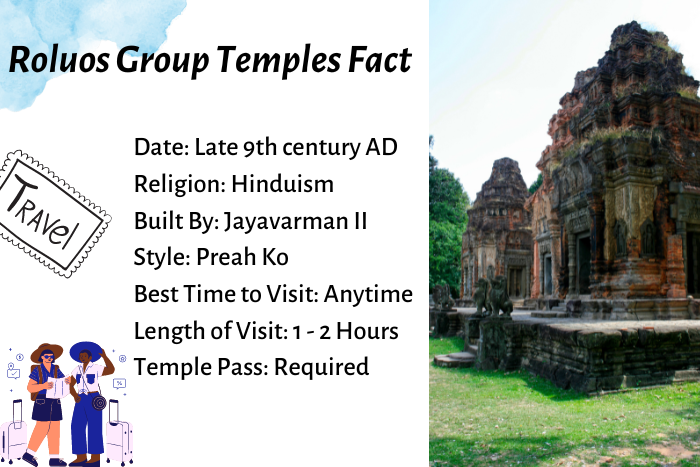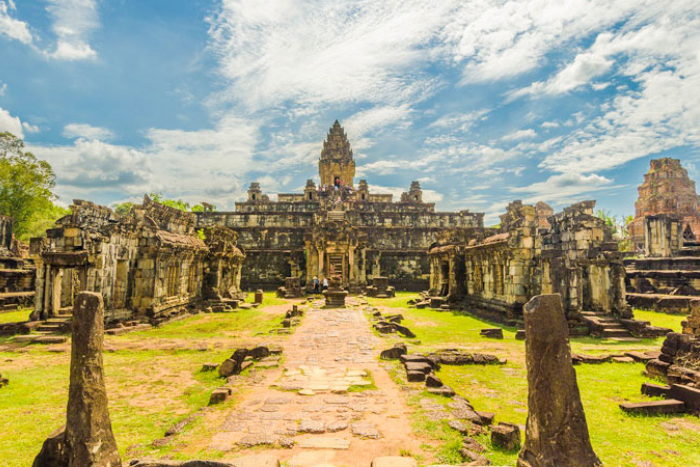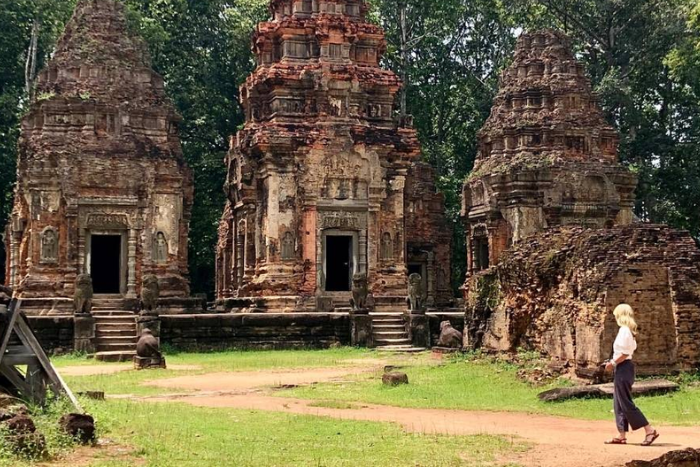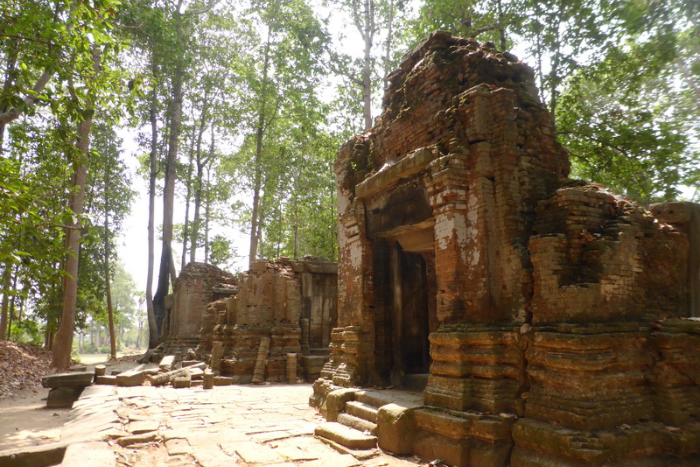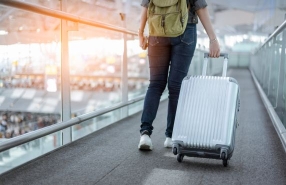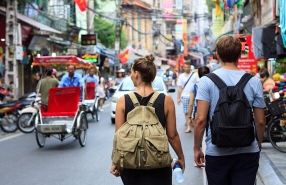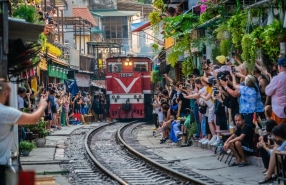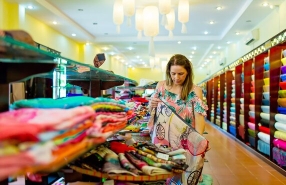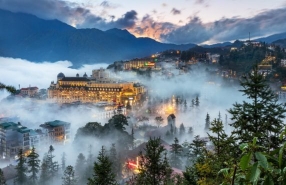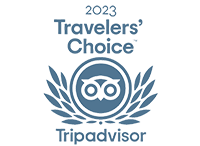Siem Reap, Cambodia is renowned not just for its delectable cuisine and captivating attractions but also serves as a pivotal stop for tourists visiting Cambodia, notably housing the enchanting Roluos Group Temples, a cultural gem from the early Khmer period. What to visit in Cambodia? Embark on a journey with us to delve into the rich heritage and explore this remarkable ancient site.
I. Introduction about the Roluos Temple Siem Reap
1. Rolous temple fact
Roluos Temples is a village with old buildings that came before the ones in Angkor. The Roluos group is what's left of the ancient Hariharalaya, which was the first important capital in the time of the Khmer Empire in the Angkorian era. The Sanskrit name "Harihara-alaya" means "Harihara's home". Harihara is a Hindu god who is half Shiva and half Vishnu.
2. How to get there?
By Tuk-Tuk: This is the most popular and convenient option, especially if you're traveling with a small group. Tuk-tuks are readily available in Siem Reap, and you can negotiate a fare with the driver beforehand. Expect to pay around $15-$20 for a round trip.
By Remork: Another budget-friendly option is a remork, a motorcycle-drawn carriage that's common in Cambodia. They are slightly cheaper than tuk-tuks, but be sure to agree on a price before setting off.
By Bicycle: Rent a bike in Siem Reap and pedal to the Roluos temples! Enjoy the scenic countryside, pass charming villages, and get some exercise. The ride takes 45-60 minutes, so choose a bike with gears for the occasional hill.
By Car: If you're renting a car in Siem Reap, you can easily drive to the Roluos Group temples. The drive takes about 30 minutes. Parking is available at the temple sites.
3. What’s special about roluos group siem reap?
Nestled within the enchanting city of Siem Reap, Cambodia, lies the magnificent Roluos temple complex, a captivating fusion of Hindu and Buddhist architecture dating back to the 9th century, during the reigns of King Indravarman I and Jayavarman II. As the inaugural capital of the Khmer Empire, King Indravarman I commissioned the initial temples' construction in 879 AD. Under the illustrious rule of King Jayavarman II, the complex flourished, only to witness a gradual decline with the shift of the empire's capital to Angkor following his passing.
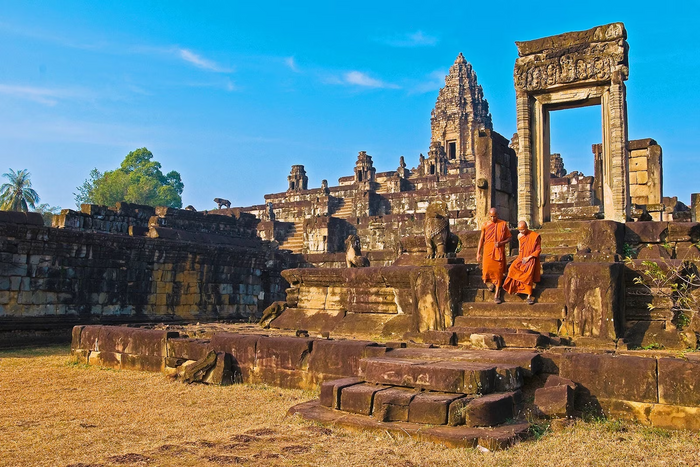
Recognised by UNESCO as World Heritage Site in 1992, the Roluos temple complex has undergone meticulous restoration efforts, transforming it into a premier destination for global travelers. Its temples, adorned with intricate Khmer architectural motifs, stand as timeless monuments to the early evolution of Khmer art and architecture. Visitors to this remarkable site are treated to a glimpse of Cambodia's rich cultural heritage and the grandeur of its ancient past.
II. The architecture of Cambodia Roluos
Roluos group comprises four significant temples: Bakong, Preah Ko, Lolei and Prei Monti. Each constructed during the late 9th century under King Jayavarman II, embodies a distinct style and purpose, serving as religious centers and royal monuments.
1. Bakong in Roluos Group
Bakong is the main and most impressive temple of the Roluos Group Temples, built in the shape of a sacred mountain, symbolizing Mount Meru, the residence of the Hindu gods. The pyramid-shaped temple is built of brick and stone on a 12-meter-high stone foundation, with intricate bas-reliefs depicting Hindu gods and biblical scenes. Bakong Temple is considered one of the first temples of Khmer architecture and the predecessor of Angkor Wat.
Built in the late 9th century by King Indravarman II, this five-tiered pyramid with its central tower and proud 15m high is considered the first major national temple of the Angkor era. Predating Angkor Wat by centuries, it represents the early Khmer architectural style, featuring stepped pyramids and sandstone tiles.
What to visit in Cambodia? As you go up, you will see the countryside and the main part of the Shiva temple. The carvings on the temple's walls share stories from Hindu mythology and the great period of the Khmer kingdom. Enjoy the views and stories as you explore. Climb the stairs and feel history beneath your feet, standing where the Khmer royal family once worshiped and consolidated their power.
2. Preah Ko: Shrines of the Bull
Preah Ko, meaning "Sacred Bull" in Khmer, stands proudly as the oldest temple in the roluos cambodia dating back to 879 AD. Built by King Indravarman I, this Hindu temple complex predates Angkor Wat for centuries and showcases the early stages of Khmer architecture. Unlike the grand scale of later Angkorian structures, Preah Ko embodies an intimate and refined style.
Preah Ko has six temples made of pink sandstone. This temple’s walls are covered with delicate carvings, which tell stories from Hindu mythology, mainly about Lord Shiva. The carvings are like ancient picture stories on the temple walls. Lions guard either side of the entrance and three majestic bull statues, representing Shiva's mount Nandi. Explore the central Prasat Kravan temple, adorned with elaborate lintels showcasing Krishna's life, and be captivated by the timeless beauty of this early architectural gem.
3. Prasat Lolei: The Temple of the Pond
Nestled amongst the roluos group siem reap lies Prasat Lolei, a 9th-century Hindu temple known as the "Temple of the Pond." Unlike its grander Angkor counterparts, Lolei exudes a serene and intimate charm. Built during the reign of King Yajnavarman, the temple is unique in that it is an island temple, and has a unique pyramid-shaped central tower. It is surrounded by an artificial reservoir, called baray in Khmer that was once used as a royal bath. The sandstone structure of this temple shimmers in the water like a tranquil painting amidst the lush Cambodian landscape.
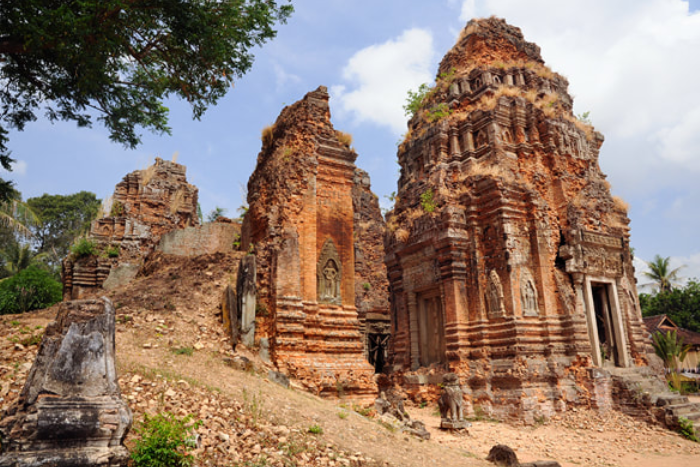
While the central tower is the main attraction, don't miss the surrounding smaller shrines, each adorned with intricate carvings depicting scenes from Hindu mythology. Even though some details have faded over time, the temple still tells stories from its rich past. When you visit Lolei, it's like taking a step back in time. Whether you're interested in history or just want a quiet moment, Lolei in the Roluos Group has something special to offer So, close your eyes, picture the sunlight dappling the temple stones, and let this ancient structure transport you to a time when spirituality and nature intertwined in Cambodia's heart.
4. Prei Monti, what to visit in Cambodia?
Nestled amongst the verdant forests of Cambodia, just south of the famed Bakong temple in Roluos, lies the ancient wonder of Prei Monti. Dating back to the 9th-10th centuries, this trio of brick towers stands as a testament to the early Khmer craftsmanship and artistry. Unlike its grander Angkorian counterparts, Prei Monti embodies a more intimate and refined style, built primarily from reddish-brown sandstone. While seemingly small, intricate carvings adorn the towers, hinting at the rich stories they hold within. Discover the main part of the temple facing east, the most important area. Whether you want a peaceful getaway or are curious about Cambodia's ancient buildings, Prei Monti has a special and interesting experience waiting for you.
III. Advice for your journey to Cambodia Roluos
Here are some invaluable recommendations to enhance your journey and enrich your experience in Cambodia.
Embrace the Local Charm - Explore the nearby village of Roluos and interact with the friendly locals to gain insights into their way of life.
Witness Sunsets Aplenty - Capture the magic of the temples bathed in the warm glow of the setting sun.
Respect the site by not touching the carvings, as the oils from the skin can damage the delicate sandstone.
Follow the designated paths to preserve the surrounding area. Wear comfortable shoes and clothing that covers your shoulders and knees, as this is required to enter the temples.
Bring sunscreen, a hat, and water, especially if you're visiting during the dry season (November to May)
The
Roluos Group Temples offer a unique opportunity to delve into the early days of the Angkorian empire. With their distinct architectural styles, rich history, and peaceful atmosphere, these temples provide an enriching experience for travelers seeking to understand the roots of Cambodian culture and marvel at the wonders of a bygone era. To have a satisfying experience that exceeds your expectations, please contact
Autour Asia, best Vietnam local agency now.

